View Post
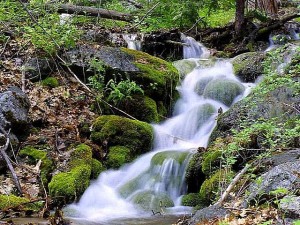
Photo by Jon Sullivan
The Moss Girl gazed from the outcrop of rocks into the clearing where the stream sparkled and the silver birches laughed, swinging their silky green hair over the water. The beeches stood behind them, the tree cover thickening away from the glade. She felt the old stones beneath her, skeleton to her skin, heard the soft music of the sunlit air and the quiet awe of the people who wandered through, commenting on the beauty of the water, the trees, the flowers that danced through the grass. It saddened her; she did not have the grace of the birches and their sisters, the ash or the colourful clothes of the starflowers and campion and buttercups. She lacked the musical voice of the flighted ones and the brilliance of the water which threw diamonds all around, the ancient stillness of the rocks and the old wisdom of the trees. The shimmering loveliness of the leaves beneath the radiance of the sun and moon was beyond her. She felt unseen amongst nature, unnoticed and unimportant.
She rose in the morning to join the dance with the tree sylphs, and they encouraged her, whirling around her and whispering ‘Well done, little sister.’ But they were taller and more elegant than she, light as air, and try as she might she could never keep up. She rose in the night to follow the naiads as they skipped and skated along the stream, and they called to her ‘Join us, little sister.’ But they were quicker and stronger than she, streamlined and sleek in the water, and she was always left behind.
One night, when the moon was full and the glade gleamed softly in the light, it became too much for the Moss Girl. She knelt bereft by the brook, watching the naiads leaping from the silvered surface and the sylphs gliding amongst the tree trunks, salt tears slipping down her face into the water and onto the ground. The naiads came to her and said ‘Don’t weep, little sister, for your tears will turn our stream into sea and we will have to leave.’ The sylphs came to her and said ‘Don’t weep, little sister, for your tears will salt the earth and our trees will not grow and we will have to leave.’ So the Moss Girl returned to her place and curled up into a ball and wept onto the rocks where she would cause no harm.
Eventually, she became aware of movement, a shifting and creaking and grinding behind her. She sat up quickly, unsure of what was happening. The surface of the stone rippled and tore; a figure began to emerge, pulling out of the very rock itself. Stillness fell over the glade – the naiads came to rest at the edge of the stream and the sylphs returned to stand silently beside their trees. The Moss Girl drew herself into the smallest space she could, all but disappearing into her soft green dress.
The figure shook herself loose from the outcrop and moved forward, stretching. The Moss Girl hid her face, recognising the power of a most ancient spirit. The Stone Mother rarely appeared in person – she, like the others of her kind, was usually there as a presence only. For her to corporealise indicated something of great importance and the Moss Girl wanted to stay out of the way. So she was surprised when she felt a hand on her head, stroking her soft green hair.
‘Why are you crying, little one?’ The voice was deep and resonant, felt through the bones of the earth.
‘Oh Mother, it is nothing important,’ said the Moss Girl, horrified that she had taken the Mother’s attention away from her duties.
‘It is important,’ the Stone Mother disagreed. ‘When one of us weeps as you are now, it affects us all.’
‘But I have no worth,’ said the Moss Girl. ‘I am plain, not beautiful like the flowers, and clumsy, not graceful like the trees, and dull, not brilliant like the naiads. I help no one, I please no one. I…’
The Stone Mother took the Moss Girl’s face in her hands.
‘Everyone and everything has its worth, child, but it should not be measured against others. You look out and see the beauty in all around you, but you have forgotten how to see it in yourself. That is why I am here – to remind you of what you truly are. Look into my eyes and you’ll see what I see.’
The Moss Girl did as she was told and looked into the Stone Mother’s dark eyes. There were pictures forming and she saw herself cushioning the rocks, the sunlight illuminating her in every glorious shade of green. She saw the many tiny creatures that made their home amongst the roots that she sent down, the birds taking bits of her loose hair to line nests ready for their young and people wandering through, reaching out to touch her appreciatively or sitting to rest cocooned in her softness.
The Moss Girl’s tears dried and she began to smile.
‘You see now, my daughter,’ the Stone Mother said. ‘We all have our place and our importance, from the greatest tree to the tiniest insect, from the most colourful butterfly to the plainest blade of grass. Never forget that you are a part of the great cycle; there is never a need to doubt yourself.’
‘Thank you, Mother. I will always remember,’ the Moss Girl replied.
The Stone Mother returned her smile. Then she cast that smile to all in the glade before returning to the rocks from whence she had come. Moments later, it was as if she had never been there at all.
Yet the Moss Girl was forever changed. No longer feeling unworthy and second-best, she danced her own dance with the naiads and the sylphs from then on.
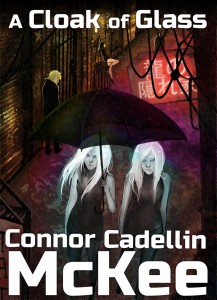
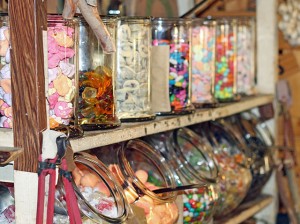


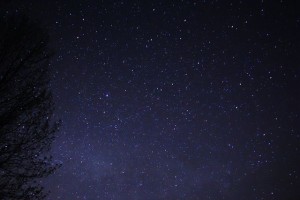
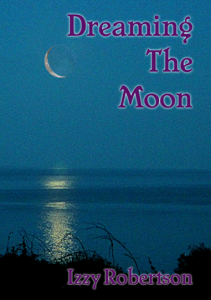
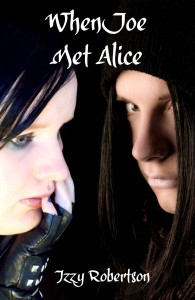 Today ‘When Joe Met Alice’ has officially entered the big wide world, and a long held dream has been realised. I have had something published! Please excuse me if I sound a little excited – in fact no, make that a big excited. As a writer you hope one day you will find yourself in print, be it paper and ink or pixels and screen, but that is tempered by all sorts of things, the vagaries of the market, what’s hot and what’s not, writer’s block, a good dose of self doubt etc., etc. However, at the risk of starting to sound like someone making a bad Oscar’s speech, I have been lucky enough to have family and friends that encouraged, enthused and occasionally nagged me, until the light at the end of the tunnel turned into sunshine and
Today ‘When Joe Met Alice’ has officially entered the big wide world, and a long held dream has been realised. I have had something published! Please excuse me if I sound a little excited – in fact no, make that a big excited. As a writer you hope one day you will find yourself in print, be it paper and ink or pixels and screen, but that is tempered by all sorts of things, the vagaries of the market, what’s hot and what’s not, writer’s block, a good dose of self doubt etc., etc. However, at the risk of starting to sound like someone making a bad Oscar’s speech, I have been lucky enough to have family and friends that encouraged, enthused and occasionally nagged me, until the light at the end of the tunnel turned into sunshine and  Well, the day is nearly here and I can hardly believe it. Tomorrow ‘When Joe Met Alice’ is officially released as an e-book, and will be available in all the usual places. ‘When Joe Met Alice’ is a romance with a magical twist, set around Halloween, which is why I’m so pleased it’s coming out now, so close to the day itself. Not surprisingly, I love Halloween, the history and the mystery, the chance to dress up and have fun, while remembering all those that have gone before. It’s a night where in the past I’ve scared myself silly swapping ghost stories with friends and watching daft horror films from behind a cushion. However now I prefer something a little gentler and kinder to my sleep pattern. Alice and Joe gave me the perfect story to celebrate with. So if you like something bitter-sweet and a little spooky, let me invite you into their world tomorrow. I hope you enjoy it!
Well, the day is nearly here and I can hardly believe it. Tomorrow ‘When Joe Met Alice’ is officially released as an e-book, and will be available in all the usual places. ‘When Joe Met Alice’ is a romance with a magical twist, set around Halloween, which is why I’m so pleased it’s coming out now, so close to the day itself. Not surprisingly, I love Halloween, the history and the mystery, the chance to dress up and have fun, while remembering all those that have gone before. It’s a night where in the past I’ve scared myself silly swapping ghost stories with friends and watching daft horror films from behind a cushion. However now I prefer something a little gentler and kinder to my sleep pattern. Alice and Joe gave me the perfect story to celebrate with. So if you like something bitter-sweet and a little spooky, let me invite you into their world tomorrow. I hope you enjoy it! At the risk of sounding quite crackers, my stories usually begin when a character walks into my head; they always have a story attached. They are often associated with a particular place as well. They mooch around for a bit and eventually become insistent that I write them down – often then the story continues to develop from there. The writing process occasionally drives on to the end (deadlines can be handy), but more often than not continues in fits and starts over a variable time frame.
At the risk of sounding quite crackers, my stories usually begin when a character walks into my head; they always have a story attached. They are often associated with a particular place as well. They mooch around for a bit and eventually become insistent that I write them down – often then the story continues to develop from there. The writing process occasionally drives on to the end (deadlines can be handy), but more often than not continues in fits and starts over a variable time frame. 
 Maybe I have a subversive streak, but I actually really like things that can’t be explained. Studying science at school and then physiotherapy, everything had to be proven, results had to be reliable and repeatable, all techniques had to be justified; the best and most efficient means to an end. And while this is absolutely desirable and necessary in many, many fields, it kind of knocks the wonder out of life a bit. I want the best of both worlds; I’m greedy I suppose. There are so many bizarre coincidences and odd happenings that we experience in life, and most of the time we measure them against our known parameters and come up with the most likely, logical explanation. But sometimes I think what if there is something else going on? Some other force at play? And as well as scaring myself silly, ‘what if’ is a very good place for a story to start.
Maybe I have a subversive streak, but I actually really like things that can’t be explained. Studying science at school and then physiotherapy, everything had to be proven, results had to be reliable and repeatable, all techniques had to be justified; the best and most efficient means to an end. And while this is absolutely desirable and necessary in many, many fields, it kind of knocks the wonder out of life a bit. I want the best of both worlds; I’m greedy I suppose. There are so many bizarre coincidences and odd happenings that we experience in life, and most of the time we measure them against our known parameters and come up with the most likely, logical explanation. But sometimes I think what if there is something else going on? Some other force at play? And as well as scaring myself silly, ‘what if’ is a very good place for a story to start.